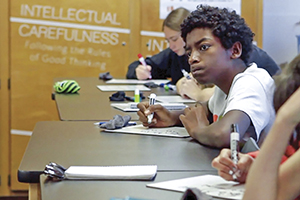
Intellectual Virtues and the Formation of Good Citizens
Drawing on Project Zero research, a middle school in Long Beach, Calif., explores the character strengths that support democracy
BY JASON S. BAEHR/School Administrator, May 2022
 |
| Students at the Intellectual Virtual Academy Middle School in Long Beach, Calif., focus on virtues such as open-mindedness, curiosity and tenacity through classroom instruction and extracurricular programs. PHOTO COURTESY OF INTELLECTUAL VIRTUES ACADEMY MIDDLE SCHOOL, LONG BEACH, CALIF. |
Perhaps now more than ever, the demands of good citizenship extend not merely to how we behave in the public square, but also to how we think, reason, acquire evidence, assess arguments and respond to people with whom we disagree.
On a daily basis, we are flooded with information on matters of considerable political importance. Often, this information is inconsistent and its quality is difficult to assess. How are we to know which sources to trust?
We can resolve to “trust the experts,” but assessing a particular person’s claim of expertise can itself be a formidable challenge. What’s more, sometimes even credible experts don’t see eye to eye. In the present milieu, we also may be tempted to demonize and dis-miss people with whom we disagree. From the standpoint of our respective filter bubbles and epistemic cocoons, our political adversaries can appear out of their minds, or worse.
This is not a recipe for healthy democracy. For a democracy to function well, its citizens need access to credible information about a range of political, legal, scientific, economic, historical, educational and other issues. They must be equipped to evaluate this information carefully, intelligently and patiently. While thinking for themselves and drawing their own conclusions, they also must be mindful of their intellectual limitations and be willing to rely on and trust those who are most knowledgeable.
In the face of political disagreement, democratic citizens must expose themselves to multiple perspectives and give these perspectives a fair and honest hearing. They must resist the temptation to caricature and demonize people or ideas they disagree with.
Supporting Democracy
To express this point another way, we as citizens must practice a
wide range of “intellectual virtues” like curiosity, open-mindedness, fair-mindedness, intellectual carefulness, thoroughness, courage, patience and perseverance.
Intellectual virtues are the character strengths of good thinkers and learners. They motivate and equip us to ask thoughtful questions (curiosity), form our own conclusions (autonomy), admit what we don’t know (humility), avoid careless mistakes (carefulness), consider alternative perspectives (open-mindedness), take intellectual risks (courage), and persist in the face of intellectual struggle and challenge (perseverance). They prepare us to engage in the kind of thinking, learning, reasoning and reflecting necessary for good citizenship.
Of course, what’s true for educators is also true, perhaps even more true, for the students we serve. Soon they’ll be the ones grappling with the epistemic demands of good citizenship.
If we believe, as most educators do, that a good education should prepare students for responsible citizenship, then a pressing question emerges: What can schools do to help students cultivate intellectual virtues like curiosity, open-mindedness and intellectual courage? How can educators help students develop the intellectual values, skills and dispositions they’ll need to preserve our democracy?
Long Beach’s Pursuits
Some friends and I found ourselves wrestling with this question slightly more than a decade ago. We had taken some initial steps toward founding a school devoted to teaching traditional academic content and skills in ways that would nurture students’ growth in intellectual virtues.
With a grant of more than $1 million from the John Templeton Foundation, we had an opportunity to “think big” and to systematically design an entire educational program around this ambitious vision. The result was the Intellectual Virtues Academy of Long Beach, a charter middle school that opened in fall 2013 in Long Beach, Calif.
When designing the grades 6-8 school, commonly referred to as IVA, we drew heavily on work by researchers at Project Zero, an education research institute at the Harvard Graduate School of Education. The work of Ron Ritchhart, author of
Creating Cultures of Thinking, on thinking dispositions and thinking routines was especially useful. We also pulled from the theoretical work in my own field of virtue epistemology, an approach to the philosophical study of knowledge that foregrounds a concern with intellectual virtues.
Nearly 10 years later, IVA is flourishing. It has a diverse student body, is oversubscribed and is in a sound financial position. Student test scores exceed local district and state averages. The culture of the school is vibrant, hopeful and centered around intellectual exploration and growth. Perhaps most significantly, IVA is a happy place, with remarkably high satisfaction rates among teachers, students and parents.
In my recent book,
Deep in Thought: A Practical Guide to Teaching for Intellectual Virtues (Harvard Education Press, 2021), I explore the principles, postures and practices central to educating for intellectual virtues. This approach is not monolithic. It isn’t built around a single technique or intervention. Nevertheless, to provide a general idea of what the approach looks like in action, I’ll briefly describe three core practices and values central to IVA’s efforts to educate for intellectual virtues.
Core Practices
IVA, which now enrolls approximately 250 students, places a high and systematic priority on cultivating caring, trusting and respectful relationships between the school leadership and staff, among the teachers, between the teachers and students, among the students and throughout the school.
This is evident in IVA’s use of restorative practices to address student conflict, a weekly advisory program designed to ensure that every student feels known and cared for by at least one adult at the school, a collaborative and empowering approach to decision making, “character conferences” between students and their parents and teachers, a meaningful and growth-oriented professional development program and an annual staff retreat.
Why should educating for intellectual virtues require an emphasis on caring and trusting relationships? In trying to help students grow in intellectual virtues, we are inviting them to rethink some of their fundamental intellectual beliefs and values, to reorient their approach to thinking and learning. This kind of personal change is unlikely to occur in environments that seem unsafe or uncaring. Thus, IVA views the cultivation of caring and trusting relationships throughout the school as a critical precondition for the kind of intellectual growth it seeks to nurture.
Aristotle famously taught that we acquire virtues like honesty and generosity by practicing virtuous actions, such as telling the truth and giving freely of our financial resources. The same is true for intellectual virtues, which are developed partly by practicing intellectual skills such as asking thoughtful questions, considering multiple perspectives, acknowledging one’s intellectual limitations, taking intellectual risks and persevering in the face of intellectual struggle.
In keeping with this ancient wisdom, a signature feature of IVA’s educational approach is creating frequent and well-supported opportunities for students to practice intellectual virtues. This involves, among other things, applying “thinking routines” across the curriculum. Routines such as “See Think Wonder,” “Claim Support Question” and “A Circle of Viewpoints” provide students with structured opportunities to make careful observations, identify connections between ideas, ask thoughtful questions and consider multiple viewpoints. These routines and the kinds of thinking they elicit are a pervasive feature of an IVA education.
IVA teachers also place a premium on modeling intellectual virtues. In the classroom, they display an intense curiosity about their subject matter. They think and wonder aloud. They also model virtues like intellectual courage and humility, taking intellectual risks and acknowledging when they don’t know the answer. This kind of modeling is powerful. It provides students with a concrete and inspiring example of what intellectual virtues look like in practice.
 |
| Jason Baehr |
These practices are not wholly new or unique. Good teachers always have cared about creating safe and supportive environments for their students, providing them with opportunities to practice the virtues of good thinking and modeling these virtues themselves. Nonetheless, in our experience, the rich and varied language and concepts of intellectual virtue provide a way of unpacking, structuring and motivating the best and most vital forms of teaching and learning. This, in turn, adds meaning and purpose to the educational experience of teachers and students alike.
Integrating Training
Many teachers believe a good education should prepare students for responsible citizenship. However, many also feel unsure about how to incorporate this aim, especially given the countless other responsibilities with which they’re tasked.
As we have tried to model at IVA, educating for intellectual virtues isn’t something one does in addition to teaching academic content and skills. Rather, it is a way of teaching content and skills. As such, educating for intellectual virtues is an opportunity to combine or integrate academic instruction with civic preparation.
Educating for intellectual virtues involves engaging in traditional academic activities in a way that can help students cultivate the attributes of intellectual character necessary for responsible citizenship in the 21st century.
JASON BAEHR is a professor of philosophy at Loyola Marymount University in Los Angeles.